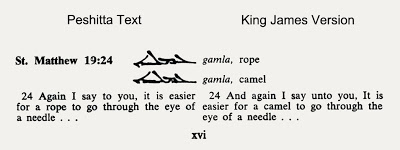“Those who know Arabic are jinn among humans, they can see what nobody else can.
Imam Shafii
“Again I tell you, it is easier for a camel to go through the eye of a needle than for someone who is rich to enter the kingdom of God.”
— Matthew 19:24 (NIV)
- it is easier for a camel to go through the eye of a needle…
- it is easier to thread a hawser through the eye of a needle…

https://billziegler1947.com/2017/02/04/arabic-what-gives/#lemon
I also discuss the root system in A Safari into the Sahara
An alternative scripture, The Qur’an, provides just such a footnote. Here is one from the well-respected translator M.A.S. Abdel Haleem:
The gates of Heaven will not be open to those who rejected Our revelations and arrogantly spurned them; even if a thick rope a were to pass through the eye of a needle they would not enter the Garden.
— Quran “The Garden” 7:40 M.A.S. Abdel Haleem translation 2004
Haleem inserts this footnote for 7:40:
Not ‘camel’. The roots of the words for ‘camel’ and ‘thick twisted rope’ are the same in Arabic and ‘rope’ makes more sense here (Razi).
Thanks for reading.
